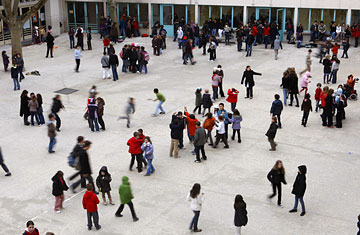
Children gather in the playground of a school in Vincennes, near Paris, in March 2009
When the public-school office of the sixth district of Paris summoned me on the telephone to a meeting late last year, the official's tone of urgency sent me running down the block, into the 19th century courtyard of the town hall and up the narrow stairs to the top floor.
"What does your son eat for lunch?" the woman asked, after I ran in breathless. I had no idea what to say. When my son started nursery school last September at the age of 3, I registered him for the school-lunch program. But when he failed to appear in the lunchroom after that, city officials quickly took notice. My explanation--that I thought he should take a break in the middle of the school day and eat lunch at home --was apparently not sufficient. This was personal.
"The food is very good, Madame. The meat is 100% French," the official said, picking up a brochure from her desk. I knew this brochure well, having e-mailed it to friends in the U.S. last year as a this-could-only-happen-in-France conversation piece. It lists in great detail the lunch menu for each school day over a two-month period. The week's menus are posted on the wall outside every school in the country and changed each Monday. The variety is astonishing: no single meal is repeated over the 32 school days in the period, and every meal includes an hors d'oeuvre, salad, main course, cheese plate and dessert.
There is more: the final column in the brochure carries the title "Suggestions for the evening." Those, too, change daily. If your child has eaten turkey, ratatouille and a raspberry-filled crepe for lunch, the city of Paris suggests pasta, green beans and a fruit salad for dinner.
I finally saw the system in action last month. I was caught short by a sick nanny, so my son, who was accustomed to eating leftovers from the refrigerator, sat in silence with his 25 classmates at tables in the nursery-school cafeteria, while city workers served a leisurely, five-course meal. One day, when I arrived to collect him for an afternoon appointment, a server whispered for me to wait until the dessert course was over. Out in the hall, one of the staff shouted for "total quiet" to a crowd of 4-year-olds awaiting the next lunch seating. "I will now read you today's menu," he told them. "First you will begin with a salad."
Americans struggling with obesity have for years wondered how the so-called French paradox works. How does a nation that ingests huge quantities of butter, beef and cakes keep trim and have such long lives? It could be the red wine, as some believe. But another reason has to be that in a country where con artists and adulterers are tolerated, the laws governing meals are sacrosanct and are drummed into children before they can even hold a knife. The French don't need their First Lady to plant a vegetable garden at the Elysée Palace to encourage good eating habits. They already know the rules: Sit down and take your time, because food is serious business.
